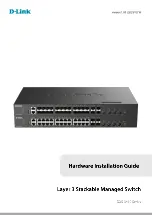
Parameter
Description
Default
loop prevention
The method the routing switch uses
to prevent routing loops caused by
advertising a route on the same
interface as the one on which the
routing switch learned the route:
•
Split horizon -
The routing switch does not
advertise a route on the same
interface as the one on which the
routing switch learned the route.
•
Poison reverse -
The routing switch assigns a
cost of 16 "infinite" or
"unreachable") to a route before
advertising it on the same
interface as the one on which the
routing switch learned the route.
Poison reverse
receive
Define the RIP version for incoming
packets
V2-only
send
Define the RIP version for outgoing
packets
V2-only
Configuring RIP redistribution
You can configure the routing switch to redistribute connected, static, and OSPF routes into RIP. When you
redistribute a route into RIP, the routing switch can use RIP to advertise the route to its RIP neighbors.
To configure redistribution, perform the following tasks:
Procedure
1.
Configure redistribution filters to permit or deny redistribution for a route based on the destination network
address or interface. (optional)
2.
Enable redistribution.
Defining RIP redistribution filters
Route redistribution imports and translates different protocol routes into a specified protocol type. On the
switches, redistribution is supported for static routes, directly connected routes, and OSPF routes. Redistribution
of any other routing protocol into RIP is not currently supported. When you configure redistribution for RIP, you
can specify that static, connected, or OSPF routes are imported into RIP routes. Likewise, OSPF redistribution
supports the import of static, connected, or RIP routes into OSPF routes.
Changing the route loop prevention method
RIP can use the following methods to prevent routing loops:
180
Aruba 3810 / 5400R Multicast and Routing Guide for ArubaOS-
Switch 16.08
















































